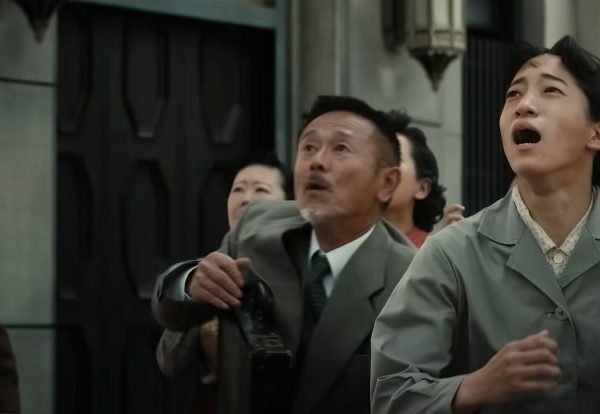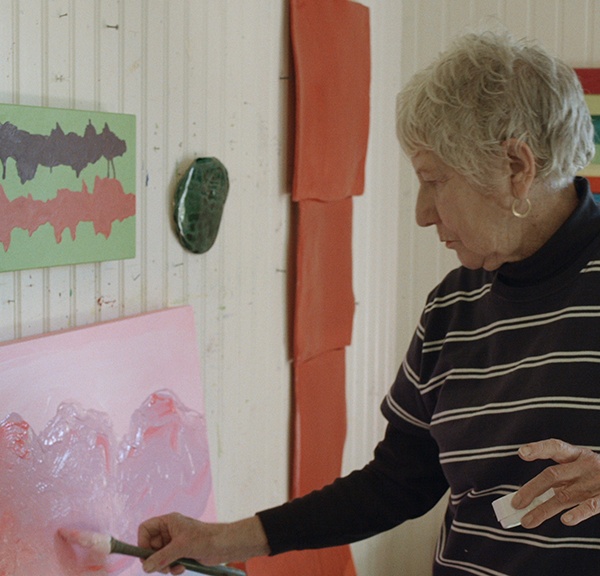Hollywood may still be struggling to regain its pre-pandemic foothold, but the Japanese film industry is absolutely thriving, with local admissions rising almost one-third in 2022 and domestic product accounting for nearly 70 percent of the local box office. Better yet, both of those figures might well bump up even higher in 2023, thanks to the blockbuster release of a new Hayao Miyazaki movie and an indie market that continues to grow in the face of streaming headwinds and a (slightly) shrinking national screen count.
What does that mean for those of us living on the other side of the world? It means we’re missing out on more great Japanese films than ever. It also means that Japan Cuts — North America’s largest festival dedicated to new Japanese cinema — is somehow even more invaluable now than it has been over the last 16 years.
Produced in partnership with — and hosted by New York’s Japan Society — Japan Cuts 2023 reflects the festival’s long-standing ability to reflect the full spectrum of Japanese cinema, with a lineup that ranges from glossy studio movies (“The Legend & Butterfly”) and a backboard-breaking anime hit (“The First Slam Dunk”) to micro-budget indies that may never stream in the U.S. (“J00531”) and even a (very) softcore porno that proves to be more charming than most straight romantic dramas (“Hand”).
Add in a retrospective screening of Elizabeth Lennard’s 1985 documentary about the late composer Ryuichi Sakamoto (“Tokyo Melody”), a time loop comedy about office staffers forced to relive the same work week for all eternity (“Mondays”) and a true-life legal thriller about peer-to-peer file-sharing (“Winny”) and you’ve got the makings of a manageable, well-curated lineup that’s full of surprises and light on wrong turns.
Here are five must-see films at Japan Cuts 2023.
-
“The First Slam Dunk” (dir. Takehiko Inoue)

Image Credit: GKIDS It’s rare for the creator of a famous manga to direct the anime adapted from their work, and virtually unheard of for them to do a better job of it than any more experienced filmmaker might. Katsuhiro Otomo’s “Akira” is one glaring exception that proves the rule, and now Takehiko Inoue’s “The First Slam Dunk” — based on his long-running “Slam Dunk” series, which ran in the pages of “Weekly Shōnen Jump” from 1990 until 1996 — is another.
Winner of the Japan Academy Prize for Best Animated Film and already the fifth-highest-grossing anime feature of all time before GKIDS releases it in American theaters this Friday, “The First Slam Dunk” isn’t the case of a successful cartoonist going back to the well in search of a new revenue stream, it’s the work of a gifted storyteller who saw a fresh take on his most famous creation and run with it as fast as he could.
Crystallizing the essence of his manga into a self-contained gem that can be fully enjoyed without any familiarity with its source material, Inoue squeezes 31 volumes of manga into 123 minutes of movie by distilling his epic saga about a high school basketball team into the span of a single game — one that we see from start to finish with only a small handful of elisions. The premise is pretty familiar, as the underdogs of Shōhoku High School face off against a team so good that it would be insulting to refer to them as rivals, but the game itself unfolds like nothing you’ve ever seen before, as Inoue uses an elaborate flashback structure to profile the players and coaches (of both teams!) between each jump-shot and desperate rebound.
Competing interior monologues invite each possession to feel like a matter of life and death, while an effective mix of hand-drawn and rotoscope animation endows key plays with the motion-blurring excitement of a “Dragonball Z” without sacrificing any of the film’s emotional reality. Throw in some juicy melodrama and a judiciously used cheese-rock soundtrack and you’ve got one of the most formally ambitious and emotionally layered sports films ever made.
-
“I Am What I Am” (dir. Shinya Tamada)

Image Credit: © 2022 I Am What I Am Production Committee Shinya Tamada’s richly affecting “I Am What I Am” begins how every movie should: With “Drive My Car” chauffeur Toko Miura sitting in a bar and lecturing her friends on the finer points of Tom Cruise’s iconic sprint, with a special focus on his stride in “War of the Worlds.” You see, Spielberg’s post-9/11 blockbuster is the rare movie in which Cruise is playing a regular guy who’s scared out of his mind; it’s the rare movie in which Cruise is running from something more often than he’s running toward it.
An asexual 30-year-old who’s been running away from society’s expectations of her for as long as she can remember, Kasumi has embraced that character as a personal avatar of sorts. Kasumi’s marriage-obsessed mom thinks she’s just being difficult, and her pregnant sister thinks that she’s a closeted lesbian, but the actual truth would be more difficult for her friends and family to understand: Kasumi doesn’t harbor any romantic feelings or sexual attraction to anyone, which would be well and good if the world around her weren’t so insistent upon making that feel like some kind of fatal defect.
A sweet and breezy story of self-love that unfolds with the natural airiness of a Mia Hansen-Løve film, “I Am What I Am” follows Kasumi through a series of arranged dates, chance encounters, and new career opportunities as she tries to avoid the all-seeing eye of normativity while searching for the role that (platonic) love might still be able to play in her life.
Like the character who Cruise plays in “War of the Worlds,” Kasumi isn’t cut out to be a hero or save the day, she just wants to live on her own terms, without being turned into red goo by an extraterrestrial army or forced to marry a guy who won’t understand her. Watching her figure out how to do that is fun and satisfying, and best of all it doesn’t completely go to shit with a Tim Robbins cameo at the start of the third act.
-
“The Three Sisters of Tenmasou Inn” (dir. Ryuhei Kitamura)

Image Credit: © 2022 Tsutomu Takahashi / SHUEISHA, Tenmasou Production Committee It might sound reductive to describe a new Japanese film as “Spirited Away” meets “After Life,” but Tsutomu Takahashi’s poignant (if pleasantly overcranked) “The Three Sisters of the Tenmasou Inn” doesn’t really leave you much choice. The multi-talented but mononymous actor-model-singer Non stars as a comatose woman named Tamae, who arrives in the movie’s ordinary-looking spirit world after her soul is separated from her body in the wake of a near-fatal car accident.
Forced to choose whether she’d like to return to her place in the mortal world or be reborn anew, Tamae mulls her options while scrubbing the floors at an oceanside inn run whose guests are all facing the same fate — an inn that also happens to be operated by the half-sisters she never knew she had.
From that familiar premise, Takahashi spins an 150-minute supernatural melodrama that unfolds with the episodic flow of a television series, eventually spilling beyond the inn and into the purgatorial folds of the town around it (a place full of heartrending subplots about people and dolphins alike). The tangled web of relationships that form between Tamae, her sisters, and several of the guests who pass through complicates the stakes of Tamae’s final decision at every turn, as each bonding moment and beachside stroll weighs the pain of regrets against the impermanence of being alive (“No world lasts forever,” someone cautions, not even a world between worlds).
“The Three Sisters of the Tenmasou Inn” isn’t afraid to yank on your heartstrings, but even its most egregious manipulations help point towards the feeling that family is too precious a gift to be thrown away.
-
“Wandering” (dir. Sang-il Lee)

Image Credit: © 2022 “Wandering” Film Partners. Japan Cuts is too well-curated to court empty controversy or push buttons for the sake of cheap provocation, but it also refuses to shy away from the kind of explosive subject matter that might render a film unreleasable in the United States. Screening in New York at the height of “Sound of Freedom” summer (and the related “groomer” hysteria that right-wing America has cultivated as a weapon against the queer community and anyone else they don’t like), it’s hard to imagine a stickier wicket than Sang-il Lee’s “Wandering,” a long and meditative drama that dares to explore the mutual affection that develops between a nine-year-old girl and the pedophile who abducts her. Or at least agrees to take her in.
The story begins 15 years later, when the now-adult Sarasa — on the verge of marrying her brooding but successful boyfriend — has a chance encounter with the mild-mannered Fumi at the cafe where he works the most low-profile job he can find. Arriving at a pivotal moment in her life, this unexpected reunion forces Sarasa (and us) to reflect on the complexities of her summer with Fumi, which began at a time when the little girl was being abused at home and desperate for a place where she could feel safe. She found it in the unlikeliest of places: With an otherwise gentle man who was determined to triumph over the deviant sexual appetites that once led him to do unspeakably terrible things.
This fearless exploration of self-image and social judgment may engender more sympathy for the devil than some audiences can abide, but Lee’s delicate script acknowledges the dynamics of grooming even as Sarasa insists she’s not a person to be pitied, just as it recognizes the profound harm of Fumi’s actions in order to weigh them against the kindness they inspired from him in return.
If you’re looking for a morally ambivalent night at the movies, “Wandering” has you covered and then some.
-
“When Morning Comes, I Feel Empty” (dir. Yuho Ishibashi)

Image Credit: Ippo Japanese films reliably boast some of the world’s most expressive movie titles (previous Japan Cuts standouts include “Sennan Asbestos Disaster,” “MUMON: The Land of Stealth,” and “Zombie Ass: Toilet of the Dead”), but few have painted a picture as vivid as Yuho Ishibashi’s “When morning comes, I feel empty.” By the time the sun rises on Nozomi (“Asako I & II” star Erika Karata) at the start of this delicate wisp of a drama — the stunted 24-year-old standing at the edge of a bridge at dawn and contemplating an entire lifetime of fraught choices as part of her daily commute to the convenience store where she works — you already know the exact contours of her desolation. It’s a profound sadness; lower-case but all-consuming.
But Nozomi’s sadness doesn’t stem from stocking shelves or selling Pocari Sweat to angry old men who insist on paying with exact change. On the contrary, she seems quite at peace with the humdrum nature of her job, and comfortable with the modest lifestyle demanded by a minimum-wage salary.
No, Nozomi’s distress stems from society’s disappointment in her; at the collective dismay that a beautiful young woman might be more satisfied working an unglamorous, go-nowhere job than she was exhausting herself to death on the corporate ladder. Perhaps that explains why the customers at her Daily Yamazaki always seem a little mad at her. A chance encounter with a particularly well put-together classmate from her junior high school days throws Nozomi’s choices into sharp relief, as this extremely gentle but quietly knowing film begins to make a powerful case for pursuing your own definition of happiness.





